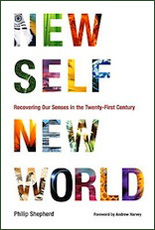Philip Shepherd is the founder of an interdisciplinary theatre company; he has worked as a corporate coach, taught creativity workshops, penned a documentary for CBS Television; and he is a playwright. This ambitious and wide-ranging book grew out of workshops he has led for more than two decades. He began to write New Self, New World in 2001 and over the next nine years played around with the issues surrounding the 10,000-year-old story of our culture and how it has run out of juice and relevance to our lives. In the foreword, Andrew Harvey defines the wake-up call presented here as "a revolution of illumined mind, sacred heart and divinized body."
Shepherd believes that the culture that influences our ideas and experiences tells us the big lie day by day: "the roots of the self do not lie in the world around us, nor even in the body, but are preserved intact within the blood-brain barrier." This fiction of self-achieved independence comes at us from all directions when everything in science and spirituality enables us to embrace the universe as an interdependent reality. Dualism is a fall-out from the head-tripping which is so predominant in our culture. Here, self and the world, idea and feeling, mind and matter, good and evil are in opposition, bringing stress and imbalance into our lives. Another fiction projected in our culture is that the head and reason take precedence over the body and feelings. This leads to an emphasis on doing over being. Living in our heads means ignoring the body and its wisdom. Shepherd counsels us to listen to the body and ask it what it needs.
One of the most creative elements in New Self, New World is the inclusion of a set of exercises to help us awaken to the body's genius and its many gifts. One of them enables us to pay attention to the beating of our own heart as a spiritual practice; another advises us to loosen and become as flexible as a seaweed plant, and a third has us lie flat and just feel the sensations going on in our body and around us.
Instead of viewing the world as a place of conflict, danger, and constant warfare, the female sensibility is sensitive to the emotions, playful, curious, an advocacy of gentleness, and a determination to call the world into harmony. Early in the book, Shepherd points to freedom, creativity, and presence as the crux of our humanity. He spells out just what this means as we begin to shift back to a female oriented culture where body genius is celebrated along with gentleness and sensitivity.
